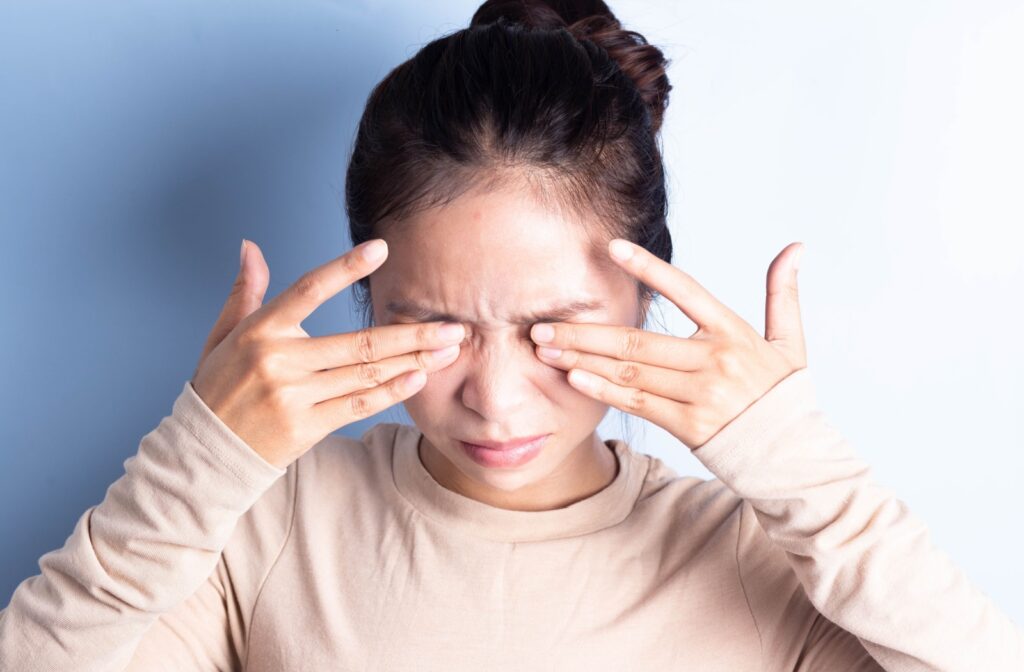Table of Contents

Introduction
Tears are a natural part of life, protecting our eyes while allowing us to express emotions. But when you notice problems with your tears, like a stinging, burning discomfort when crying, it’s often alarming. So what causes tears to sting your eyes—and what can you do about it?
If your eyes often sting while crying, this could be due to:
- Your environment
- Allergies
- Dry eye
- Blepharitis
If you’re dealing with burning and stinging eyes, visit your optometrist to find relief.
What Are Tears Made Of?
Tears are more important than you may think. They’re responsible for keeping your eyes hydrated while giving them a way to flush away harmful particles like dust, dirt, and bacteria. To function, tears need 3 key components:
-
- Mucus, to keep the tear attached to the surface of your eye
-
- Water, to keep your eye hydrated, lubricated, and protected
-
- Oil, to prevent tears from evaporating too quickly
When one of these is off-balance, your tears can no longer do their job. Your eye might not produce enough tears, or else it might not produce tears of a sufficiently high enough quality.
The Types of Tears
Though they appear the same, there are actually 3 types of tears. Each of these serves its own purpose. You have:
-
- Basal tears, the everyday tears that keep your eye protected from dust and debris
-
- Reflex tears, which are produced in response to irritating particles. These help flush away harmful contaminants.
-
- Emotional tears, which are triggered by strong emotions. These help the body relieve stress by releasing excess hormones and other toxins.
There’s a catch, though—each kind of tear has a different composition. If you’re dealing with stinging eyes every time your eyes flood with tears, it means that one of these layers—or one of the types of tears—isn’t functioning properly.
So what can cause this issue?
Your Environment
Environmental factors are the first place to look. When you’re exposed to harsher air conditions—for example, wind or excessive dryness—your eyes need to work much harder to protect themselves. They need to produce more tears to prevent drying out, but they may not have enough base components to do so.
Meanwhile, if you live in an area that often exposes you to smoke, dust, and debris, your eyes may be inflamed due to contaminating particles in the air. This can quickly lead to stinging and burning sensations.
To find relief, it helps to:
-
- Use a humidifier at home
-
- Wear wraparound sunglasses to prevent exposure
-
- Taking regular breaks if you’re in a dry or air-conditioned environment
-
- Stay hydrated
These simple tips may be all you need to find relief.
Allergies
When you have an allergic reaction, it can often lead to stinging sensations. If you encounter an allergen like pollen or dander, your body releases histamines, which cause inflammation and irritation in sensitive areas like the eyes.
Keep an eye out for other signs of an allergic reaction, like:
-
- Redness
-
- Itchiness
-
- Scratchy throat
-
- Sneezes
If you suspect allergies are the culprit, try to avoid your triggers at all costs. You can also use over-the-counter antihistamine eye drops and cool compresses to find relief from your symptoms.
Dry Eye
To create the three layers needed for tears—the mucus, oils, and water—you have special glands in your eyelids and surrounding area. These glands can sometimes become blocked or otherwise obstructed, limiting the flow of materials to the eye. When this happens, you develop a condition called “dry eye.”
There are 2 types of dry eye:
-
- Aqueous deficiency dry eye, where there isn’t enough water to make enough tears, or
-
- Evaporative dry eye, where oils can’t reach the tear film. This leads to the tear evaporating too quickly, leaving the eye exposed.
Dry eye often causes:
-
- Stinging sensations
-
- Redness
-
- Watery eyes
-
- Gritty sensations in the eye
If you notice these symptoms, it’s crucial

Blepharitis
Blepharitis occurs when your eyelids become inflamed—usually due to an excess of bacteria, oil, or dead skin cells. This can quickly result in stinging sensations when you cry, along with:
- Redness
- Swelling
- Itching
- Burning sensations
- Crusty or oily debris at the base of your eyelashes
If you suspect you’re dealing with blepharitis, proper hygiene is key. Try to regularly clean your eyelids, and use warm compresses when the condition flares up. If your symptoms persist, visit your optometrist to discuss a more targeted treatment.
When to See Your Optometrist
Stinging tears can be frustrating, but you don’t need to deal with them on your own. If you’re experiencing constant irritating, burning sensations, or any other unusual symptoms, come talk to our team at Golden Vision Optometry.
Our professional team is here to help you maintain clear, comfortable vision, so book an appointment with us today.








